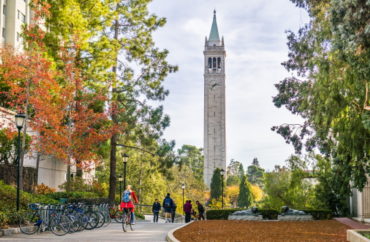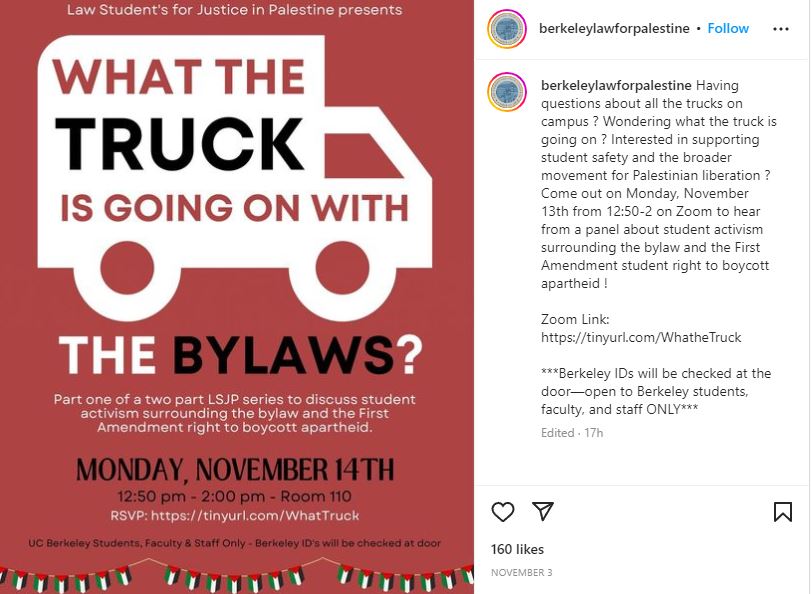
A closed-door meeting to be held at UC Berkeley today will focus on a controversial pledge that several students groups have signed on to that bans pro-Israel guest speakers.
Law Students for Justice in Palestine is hosting the meeting that is only open to UC Berkeley students, faculty and staff, with IDs to be “checked at the door,” the group stated in its announcement.
The pledge, also referred to as a bylaw, was created and lobbied for by Law Students for Justice in Palestine at UC Berkeley Law School this semester. It has prompted a huge backlash on campus and across the globe, as critics of the effort argue its antisemitic and akin to creating “Jewish free zones.”
The groups that signed the pledge agreed to “include a Palestine-centered and de-colonial approach to holding club activities” and “will not invite speakers that have expressed and continued to hold views or host/sponsor/promote events in support of Zionism, the apartheid state of Israel, and the occupation of Palestine.”
Law Students for Justice in Palestine posted a copy of the pledge on its Instagram account, which has reportedly been agreed to by at least eight other campus organizations: Berkeley Law Muslim Student Association, Middle Eastern and North African Law Students Association, Womxn of Color Collective, Asian Pacific American Law Students Association, Queer Caucus, Community Defense Project, Women of Berkeley Law and Law Students of African Descent.
Berkeley Law Students for Justice in Palestine did not reply to The College Fix’s repeated requests for comment.

Dean Eriwn Chemerinsky, in a recent email to The College Fix, said that “student organizations have the First Amendment right to have speakers with the views they choose and this includes their right to have the bylaw.”
Chemerinsky, however, has expressed concern about the pledge.
He told students in August that it “is troubling to broadly exclude a particular viewpoint from being expressed. Indeed, taken literally, this would mean that I could not be invited to speak because I support the existence of Israel, though I condemn many of its policies,” according to the message, obtained by Fox News.
The ban also prompted condemnation from a variety of outside Jewish and pro-Israel groups.
An open letter sponsored by the Jewish Journal and signed by 39 organizations states that the “bylaw is a vicious attempt to marginalize and stigmatize the Jewish, Israeli, and pro-Israel community and to normalize the requirement that Zionist Jews hide or alter a fundamental aspect of their identity in order to be fully accepted in certain arenas. This is unabashed antisemitism.”
The letter explains that many Jewish people hold Zionism central to their faith. It requests that Berkeley Law School sanction LSJP and the other student organizations that agreed to the pledge if they do not rescind it.
Dean Chemerinsky, in October, responded to the campus community by stating in part that “Many have demanded that the Law School adopt a position that student groups cannot exclude speakers based on their viewpoint and that the student groups that adopted the bylaw be punished.”
“This we will not do and cannot do,” the dean said in his statement, a copy of which was provided to The College Fix.
Meanwhile, because of the massive controversy this effort has generated, Law Students for Justice in Palestine encouraged its supporters to sign an open letter denouncing the backlash as racially targeted and misinformed.
“We stand against the relentless onslaught of disinformation and false news that resulted in active threats to students who voiced their political opinions,” the letter states.
In a statement provided to The College Fix, Sacha Roytman Dratwa, CEO of the Combat Antisemitism Movement, said the bylaw is clearly antisemitic in nature. CAM is one of the groups that signed the open letter published by the Jewish Journal.
Dratwa compared the pledge to historical anti-Jewish statues because it singles out Jewish people.
“Note that the same organizers do not find equal outrage about true human rights issues around the world and the dozens of other border conflicts currently raging. By singularly pointing out only the one Jewish State, they are treating Jewish collectivity and Jewish indigeneity as separate and uniquely evil, this is antisemitism,” Dratwa said.
Dratwa said the bylaw satisfies the working definition of antisemitism published by the International Holocaust Remembrance Alliance, which he cited as a baseline agreed to by most Jewish people and many international actors.
The alliance defines antisemitism as “a certain perception of Jews, which may be expressed as hatred toward Jews. Rhetorical and physical manifestations of antisemitism are directed toward Jewish or non-Jewish individuals and/or their property, toward Jewish community institutions and religious facilities.”
MORE: Harvard hosts fiery Palestinian activist well known for antisemitic rhetoric
IMAGE: Sundry Photography / Shutterstock
Like The College Fix on Facebook / Follow us on Twitter





Please join the conversation about our stories on Facebook, Twitter, Instagram, Reddit, MeWe, Rumble, Gab, Minds and Gettr.